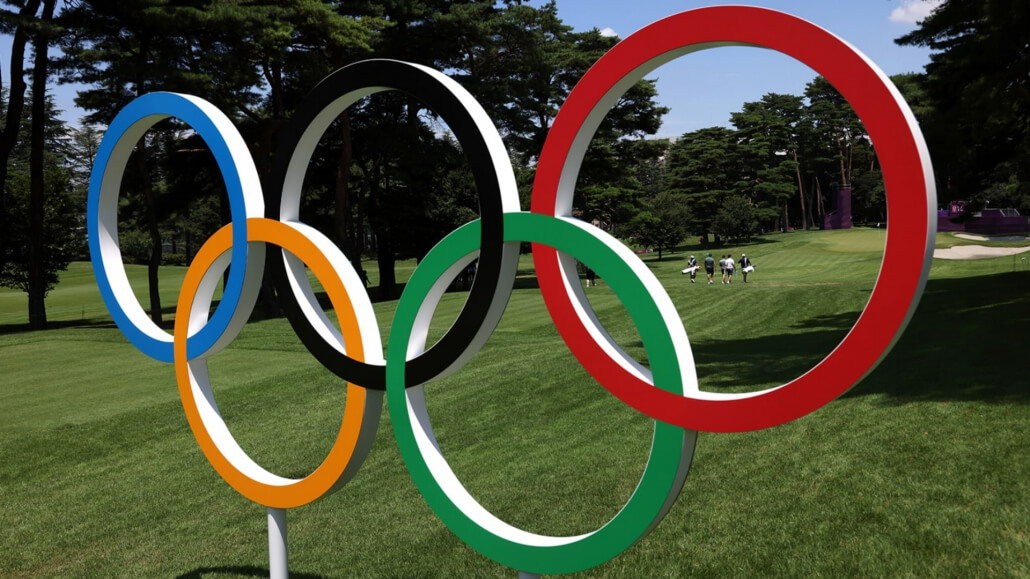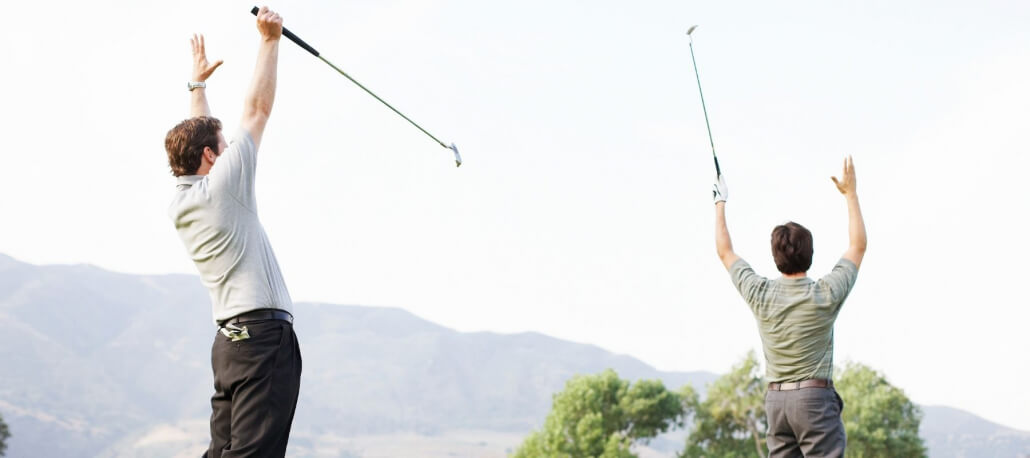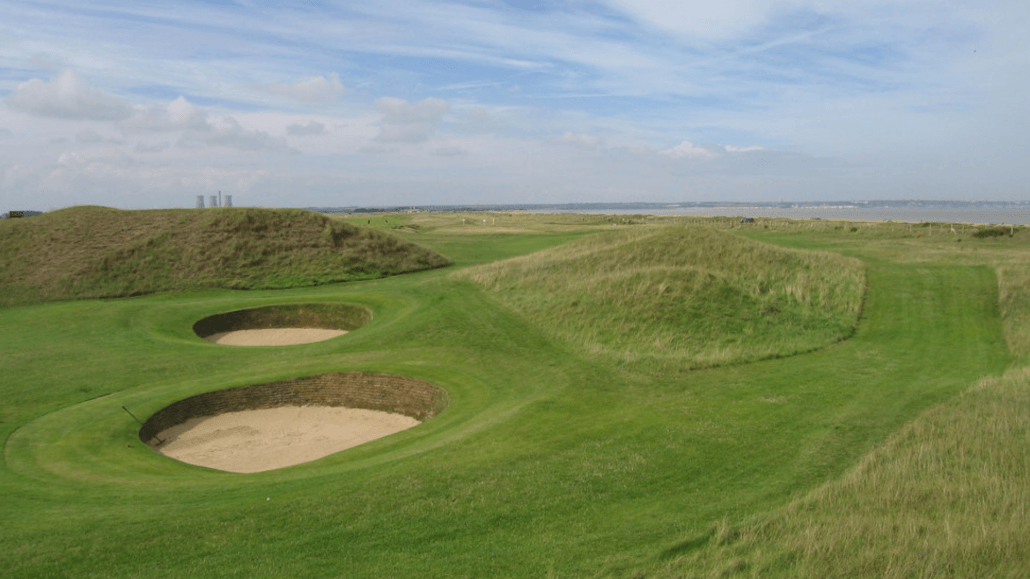
Photo: (Chris Trotman/Getty Images)

SHEBOYGAN, Wis. — Steve Stricker hoisted the Ryder Cup, gold and glorious, for all to see. Then, he quickly huddled his young American team together to make sure all 12 players had their hands on it.
Nine of them had never touched the 17-inch trophy in a moment of celebration.
They don’t expect this to be the last time.
More than just winning back the Ryder Cup on Sunday, the youngest U.S. team in history handed Europe its worst loss and delivered a message about how serious it is about changing the tone of these matches.
Daniel Berger won the final hole in the final match for the final point in a 19-9 victory, breaking by a half-point the record margin since Europe became part of the Ryder Cup in 1979.
“This is a new era,” Stricker said. “These guys are young. They want it. They’re motivated. They came here determined to win. I could see it in their eyes.”
The six U.S. Ryder Cup rookies scored more points than all of Europe, combining for a 14-4-3 record. The Americans didn’t lose a session for the first time in 44 years. Dustin Johnson became the first American to go 5-0 since 1979.
They had the best team on paper. They played even better on grass.
“It’s not just the strongest U.S. team I’ve seen, but they all played well this week,” Lee Westwood said. “Everybody performed and turned up this week. Looks like they are a team.”
The Americans finally looked like Europe, which has dominated the Ryder Cup by winning nine of the previous 12 until getting routed along the shores of Lake Michigan.
Staked to a six-point lead — no team has ever rallied from more than four points down going into the last day — the Americans quickly filled the scoreboards with their red numbers.
Scottie Scheffler took down the No. 1 player in the world with a 4-and-3 victory over Jon Rahm. Scheffler won the opening four holes and birdied five of the first six. He was among three rookies who were unbeaten this week.
Bryson DeChambeau smashed his tee shot on the 373-yard opening hole onto the green and then holed the 40-foot eagle putt to start out his win over Sergio Garcia.
The clinching blow came from Collin Morikawa, at 24 the youngest player on the team and already a two-time major champion. He made a 3-foot birdie putt on the 17th hole that assured the Americans at least the 14 1/2 points they needed.
They wanted more.
“I woke up this morning and I was trying to tell the guys, ‘Let’s get to 20 points,’ because this is going to be the next era of Ryder Cup team for the U.S. side,” Patrick Cantlay said after he completed an unbeaten week with a win over Shane Lowry.
“We’ve got a lot of young guys. I think they’re going to be on teams for a long time, and I wanted to send a message.”
Tony Finau had said on the eve of these matches that this was “the big one.” The Americans had so many fresh faces without any lasting scars from watching Europe celebrate so much over the years. It was a chance to change the culture, and this was a massive step.
The gallery saved one of its loudest cheers for Stricker, the Wisconsin native who has been at the helm of two blowouts. He guided the U.S. team to a 19-11 victory in the Presidents Cup in 2017 and added his signature piece at Whistling Straits.
Johnson became the first American since Larry Nelson in 1979 to win all five matches, completing his perfect week by beating Paul Casey in a match he never trailed.
Casey, Matt Fitzpatrick and Bernd Wiesberger all failed to win a point. Rory McIlroy and Ian Poulter, part of the backbone of European experience, didn’t win a match until singles, and by then, it was too late.
The Americans had four of the top five in the world ranking. And they finally played like it. Those four players — Johnson, Morikawa, Cantlay and Xander Schauffele — combined for a 14-1-2 record.
McIlroy led Europe off again on Sunday and gave Schauffele his first loss of the week. It wasn’t nearly enough. All day along the shores of Lake Michigan, the outcome was inevitable.
McIlroy teared up in his interview when talking about how much the Ryder Cup means to him.
As much as this was about a new generation of Americans, this looked to be an aging team of Europeans. They brought winning experience but not nearly enough form.
Garcia set the Ryder Cup record with 25 matches won in his career. Rahm was the star for Europe, living up to his billing as the No. 1 player by making so many big putts.
Both lost in singles — Garcia to DeChambeau, while Rahm ran into Scheffler, who delivered big moments of his own this week.
There was little Europe could have done. This U.S. team was loaded and played like it.
“The U.S. were very strong,” European captain Padraig Harrington said. “Whatever their plan was, they got it right this week. A strong team, played well. Kept the momentum. And they would have been tough to beat at the best of times, let alone when they are at top form. It’s a great win for them.”
The Americans won consecutive home games for the first time since 1983. The next step is winning on the road, which the Americans haven’t done since 1993.
The Ryder Cup goes to Marco Simone in Italy in 2023.
“If we play like we did this week,” Jordan Spieth said, “the score will look the same over there.”
source: AP News

KAWAGOE, Japan — Xander Schauffele won an Olympic gold medal he badly wanted by overcoming more pressure than he could have imagined Sunday.
Right when Schauffele appeared to lose his firm grip on the gold, the 27-year-old American responded with two clutch putts at the end for a 4-under 67 and a one-shot victory over Rory Sabbatini of Slovakia in a wild finish to the men’s golf competition.
One was a 6-foot birdie putt for the lead. The last one was a 4-foot par putt for the win.
“Just in shock,” Schauffele said. “I was trying so hard to just stay calm. … But man, it was stressful. And I made that putt and it was just a huge weight lifted off my shoulders and just very relieved and happy.”
The tension made the hot air feel even thicker at Kasumigaseki Country Club. When the last group walked onto the 18th green, nine players remained in the mix for a medal.
One of them was Masters champion Hideki Matsuyama, just not the medal that his golf-mad country wanted for him. He was one shot out of the lead when he missed a 3-foot par putt on the 15th hole and never caught up. He missed a 12-foot birdie putt on the 18th hole for the bronze.
And then he left with no medal at all.
Matsuyama was part of a seven-man playoff for the bronze, which included Rory McIlroy and Open Championship winner Collin Morikawa. Matsuyama made bogey on the first extra hole and was eliminated, ending a week of high expectations.
No gold, silver or bronze. The 29-year-old Japanese star still has a Masters green jacket.
C.T. Pan of Taiwan, who closed with a 63, won the bronze in a playoff among seven countries that lasted four holes.
Matsuyama and Paul Casey were eliminated with bogeys on the first extra hole. McIlroy, Mito Pereira of Chile and Sebastian Munoz were eliminated with pars on the third hole. Pan holed an 8-foot par putt on the 18th, after Morikawa’s approach plugged in the sand short of the green and left him a long par putt he couldn’t convert.
Schauffele, whose mother was raised in Japan and has grandparents in the city who were kept from watching him under the ban on spectators, appeared to have this won all along.
Sabbatini set the Olympic record with a 61, finishing with a fist-pumping birdie on the 18th hole. That put him one shot behind Schauffele, who still had two good scoring chances among the six holes ahead of him on the back nine.
And then one swing changed everything.
Schauffele sent his tee shot well right of the fairway on the par-5 14th and into the bushes. He had to take a one-shot penalty just to get out, took three more shots to reach the green and made a 5-foot putt to limit the damage to a bogey.
He was tied for the lead, with Matsuyama one shot behind.
Schauffele kept his California cool and hit driver into a greenside bunker on the 17th hole, where the tees were moved forward to create some excitement. He blasted out to 6 feet and made birdie to regain the lead.
One par for the gold. If only it were that simple.
Schauffele sent another drive to the right, getting a nice kick into the rough but blocked by the trees, forcing him to lay up short of the water. From 98 yards, he hit a lob wedge some 15 feet behind the pin and watched it spin back to 4 feet.
He looked more relieved than he was elated after the putt dropped. It was his first victory since January 2019, and the No. 5 player in the world found the ideal place to end the drought.
Schauffele had been pointing to the Olympics, especially in Tokyo, ever since he first joined the elite in American golf three years ago. His German-born father, Stefan, had dreamed of being an Olympian until his car was struck by a drunk driver on his way to decathlon training when he was 20, costing him his left eye.
Peering through his monocular, Stefan Schauffele saw his dreams fulfilled through his son.
The embrace they shared afterward was pure gold.
“To have my dad here as well is really special,” Schauffele said. “I gave him a hug off the back of the green there. I know this means a lot to him, so I’m just happy to sort of deliver this.”
Sabbatini had plenty to be happy about with silver. Born in South Africa, he decided at the end of 2018 to become a Slovakian citizen through his wife, Martina, who had a relative running the tiny Slovak Golf Federation. His wife caddied for him this week.
That made him eligible for the Olympics, and now Slovakia has its third medal in the Tokyo Games. It has a gold in women’s trap and a silver in men’s kayak. Sabbatini is the first Slovakian to compete in Olympic golf.
“The sole purpose of it was to generate future generations of Slovak golfers,” Sabbatini said. “It’s not exactly the prime sport for kids to grow up and want to go play in Slovakia, so hopefully we can inspire future Olympians.”
SOURCE: pgatour.com

Photo: (Chris Trotman/Getty Images)
Golf is making its second consecutive Olympics appearance after a hiatus that lasted longer than a century. In case you need a refresher since Rio, we’re here with a quick outline of the format for the Olympic golf competition, which begins Thursday with the first round of the men’s competition from Kasumigaseki Country Club’s East Course.
FORMAT
Both the men’s and women’s golf competitions will be 72 holes of stroke play.
FIELD
The Olympic field is restricted to 60 players for each of the men’s and women’s competitions. The IGF will utilize the official world golf rankings to create the Olympic Golf Rankings as a method of determining eligibility. The top 15 players in the world will be eligible for the Olympics, with a limit of four players from a given country. Beyond the top 15, players will be eligible based on the world rankings, with a maximum of two eligible players from each country that does not already have two or more players among the top 15.
TIEBREAKERS
Medals will be awarded for first, second and third place to the top three finishers in each competition. Ties for first, second and third place will be broken by sudden-death playoff.
If two players are tied for the first position, a playoff will be conducted to determine the golf and silver medals. If three or more players tie for first, a playoff will be conducted to determine the gold, silver and bronze medals. If two or more players are tied for the second position, a playoff will be conducted to determine the silver and bronze medals. If two or more players are tied for the third position, a playoff will be conducted for the bronze medal. In any case, only one gold, one silver and one bronze medal will be awarded.
For any playoff, players will play in one or more groups at the discretion of the IGF chief referee.
In the event of a playoff scenario for any or all of the medals, the IGF Rules Committee will follow the sequence below:
• One playoff : Holes 18, 10, 11 will be played and this loop will be repeated for as long as necessary. As medals are determined, play will continue to determine any remaining medals as necessary.
• Two playoffs (to determine Gold/Silver and Bronze/4th place): The gold/silver playoff will use Nos. 18, 10, 11 and this loop will be repeated for as long as necessary. The bronze playoff will use Nos. 11, 18, 10 and this loop will be repeated for as long as necessary.
GROUPINGS AND STARTING TIMES
Players will be paired in threesomes, with groups starting on the first tee. However, because of weather or unforeseen circumstances, players could be paired in groups of two or three and start rounds on both Nos. 1 and 10.
Source: pgatour.com

New Open champion Collin Morikawa intends to take a breather and drink in the history of his achievement – but he will let his caddie choose what gets put in the Claret Jug.
The American, who won the 2020 US PGA Championship on just his second major start, held his nerve to keep compatriot Jordan Spieth at bay on the closing stretch and become the first player to win two different majors on debut.
He eventually finished two shots clear of Spieth on 15 under and became only the second person after Tiger Woods to win the Open and US PGA before the age of 25.
And, having restrained himself all week, he is planning a celebration before heading home.
“I think when you make history – and I’m 24 years old – it’s hard to grasp, and it’s hard to really take it in,” he said.
“At 24 it’s so hard to look back at the two short years that I have been a pro and see what I’ve done because I want more.
“I enjoy these moments and I love it and I want to teach myself to embrace it a little more.
“We’ve been staying at the hotel right by the course. Every night I see all the caddies drink, and I’m like ‘Man, I really want to drink, but I hold back. I hold back on tournament week’.
“It’s JJ’s (caddie JJ Jakovac) birthday. I’m going to let him decide (what drink to put in the Claret Jug).”
While Morikawa may have been staying away from the alcohol this week, his success seems to have been partly fuelled by fast food.
“The secret? Well, I never do this, but I had a burger for four straight days, so my body is probably feeling it. I know my body’s feeling it,” he added.
“I think I just enjoy these moments and I talk about it so much that we love what we do.”
When Morikawa recorded his breakthrough major win at the US PGA at Harding Park in San Francisco it was in front of no fans as Covid-19 restrictions were still in full force.
So to do it in front of full grandstands – 30,000 people were allowed into Royal St George’s every day this week – was a delight for the American and he was also able to use that fact to answer those who questioned his ability to perform under pressure.
“The nerves are definitely up there, but you channel these nerves into excitement and energy, and that puts you away from like a fear factor into ‘This is something I want’,” he added.
“I had nothing to prove. It’s just to you guys (the media). I’m just answering it for you guys that we can play in front of fans.
“They are some of the best fans I’ve ever seen. They truly understand the game. They appreciate the game. We owe them a huge thank you.”
SOURCE: msn.com

The wait is over!
Grab your clubs & koozies because Fox Ridge Golf Course and Driving Range is officially opening back up tomorrow, March 10th at 10:00AM.
Weather permitting,
so please call ahead for a tee-time and weather updates.
The use of carts is TBD.
We can’t wait to see you all!”